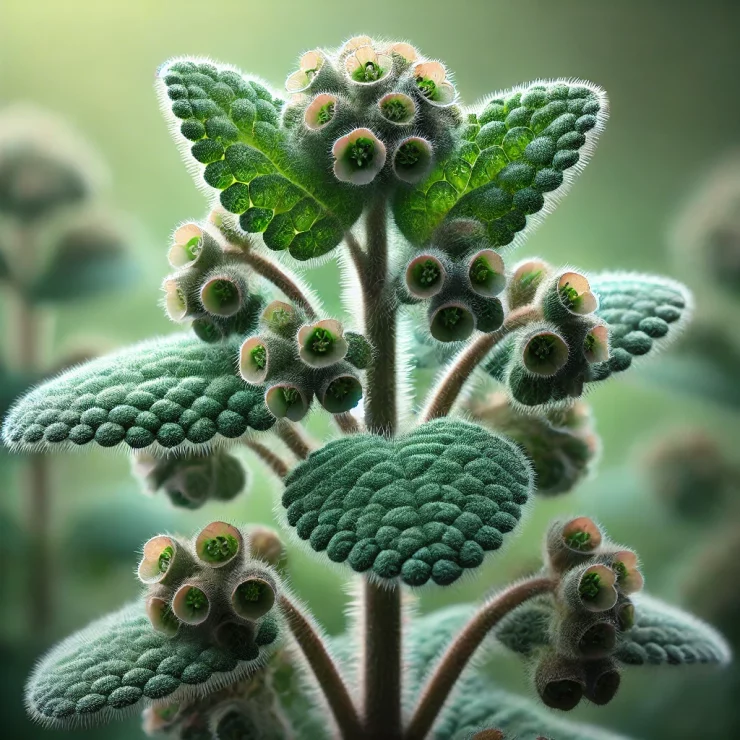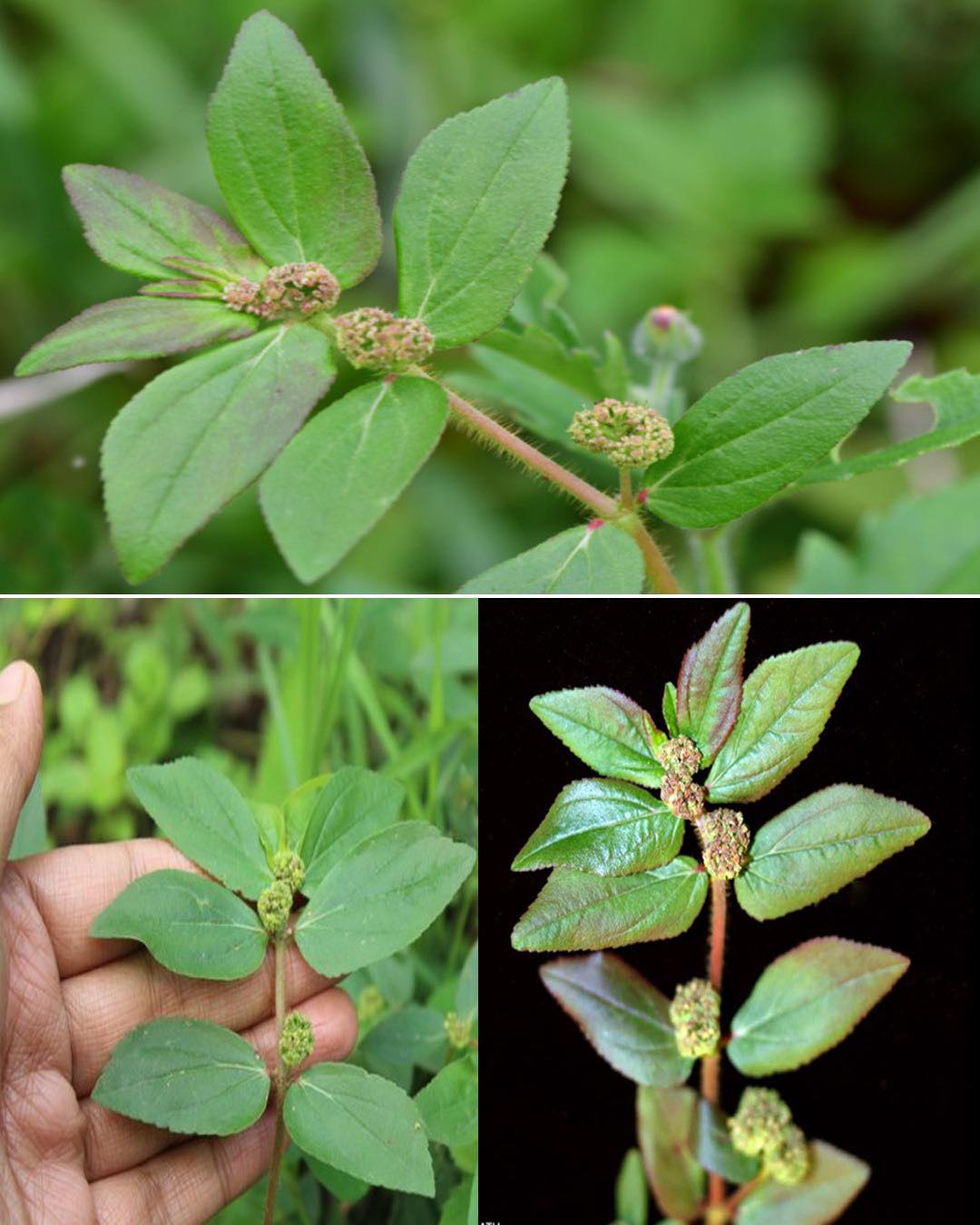Euphorbia hirta, commonly known as Asthma Weed, Snake Weed, or Pill-Bearing Spurge, is a medicinal herb that has been used for centuries in traditional medicine. Native to tropical regions, this unassuming plant is packed with potent therapeutic properties that make it a valuable natural remedy for various health conditions. Despite its modest appearance, Euphorbia hirta offers a range of surprising health benefits that you may not be aware of. Here are seven of the most notable benefits of this remarkable herb.

1.Effective Relief for Respiratory Conditions
Euphorbia hirta is widely known for its effectiveness in treating respiratory conditions, particularly asthma, which is why it is often called “Asthma Weed.” The plant’s antispasmodic and bronchodilatory properties help relax the bronchial muscles, making it easier to breathe. It is also used to relieve coughs, bronchitis, and other respiratory issues by reducing inflammation and clearing mucus from the airways.
How to Use:
Euphorbia hirta can be prepared as a tea by boiling the dried leaves and stems in water. Drinking this tea can help alleviate asthma symptoms and other respiratory discomforts.
2.Boosts Immune System
Euphorbia hirta has strong antimicrobial properties that can help boost the immune system and protect the body against infections. The plant contains compounds that are effective against bacteria, viruses, and fungi, making it a valuable natural remedy for preventing and treating various infections.
How to Use:
Drinking Euphorbia hirta tea regularly can help strengthen your immune system and ward off common illnesses like colds and flu.
3.Supports Digestive Health
Euphorbia hirta is often used to treat a variety of digestive issues, including diarrhea, dysentery, and intestinal worms. The herb’s astringent and anti-inflammatory properties help soothe the digestive tract, reduce inflammation, and restore normal bowel function. It can also help alleviate stomach cramps and discomfort associated with digestive disorders.
How to Use:
To support digestive health, Euphorbia hirta can be consumed as a tea or tincture. It is particularly effective for managing diarrhea and dysentery.

4.Promotes Skin Health
The antibacterial and antifungal properties of Euphorbia hirta make it an excellent natural remedy for various skin conditions. It can be used to treat wounds, boils, eczema, and fungal infections by preventing infection and promoting faster healing. The herb’s anti-inflammatory effects also help reduce redness, swelling, and irritation.
How to Use:
Apply a poultice made from crushed Euphorbia hirta leaves directly to the affected area to treat skin conditions and promote healing.
5.Manages Blood Sugar Levels
Euphorbia hirta has been shown to have hypoglycemic effects, meaning it can help lower and regulate blood sugar levels. This makes it a useful herb for managing diabetes and preventing complications associated with high blood sugar. The plant works by enhancing insulin sensitivity and improving glucose uptake in the cells.
How to Use:
Consult with a healthcare provider before using Euphorbia hirta to manage blood sugar levels. The herb can be taken as a tea or supplement under professional guidance.
6.Reduces Anxiety and Stress
Euphorbia hirta has calming effects on the nervous system, making it a natural remedy for reducing anxiety and stress. The herb’s sedative properties help relax the mind and body, promoting a sense of calm and well-being. It is often used in traditional medicine to treat nervous disorders and improve mental health.
How to Use:
Drinking Euphorbia hirta tea can help alleviate anxiety and stress, promoting relaxation and better sleep.
7.Anti-Inflammatory and Pain Relief
Euphorbia hirta is rich in anti-inflammatory compounds that make it effective in reducing inflammation and relieving pain. Whether you’re dealing with joint pain, muscle aches, or inflammation-related conditions, this herb can provide natural relief without the side effects associated with synthetic painkillers.
How to Use:
Euphorbia hirta can be consumed as a tea or applied topically as a poultice to reduce inflammation and alleviate pain.
How to Use Euphorbia Hirta
Euphorbia hirta can be used in various forms depending on the health benefit you’re seeking:
Tea: To make Euphorbia hirta tea, boil dried leaves and stems in water for 10-15 minutes. Strain and drink the tea to enjoy its health benefits.
Tincture: A tincture can be made by soaking the dried herb in alcohol or glycerin. This concentrated form is convenient for taking small doses.
Poultice: Crush fresh Euphorbia hirta leaves and apply them directly to the skin to treat wounds, infections, or inflammation.
Precautions
While Euphorbia hirta offers numerous health benefits, it’s important to use it with caution. The plant’s latex can be irritating to the skin and mucous membranes, so it should be handled carefully. Additionally, Euphorbia hirta should not be used during pregnancy or breastfeeding, and those with existing health conditions should consult with a healthcare provider before using the herb.
Euphorbia hirta is a versatile and powerful medicinal herb that has been used for centuries to treat a variety of health conditions. From respiratory relief and immune support to skin health and pain management, this humble plant offers a wide range of benefits that make it a valuable addition to any natural medicine cabinet. Whether you’re looking to manage a specific health issue or simply boost your overall well-being, Euphorbia hirta is a natural remedy worth considering.
News
JJ Redick reacts to Luka Doncic trade for Anthony Davis
In one of the most jaw-dropping moves of the season, the NBA landscape was rocked by the blockbuster trade involving Luka Dončić and Anthony Davis—a swap that has sent ripples of excitement, disbelief, and heated discussion through the league. Among…
Anthony Davis FULL reaction to trade to Mavericks for Luka Doncic
In a blockbuster move that sent shockwaves through the NBA and left fans reeling, Anthony Davis has been traded to the Dallas Mavericks in exchange for Luka Dončić. In the immediate aftermath of the news, Davis took to the media…
Shaq reacts to Dallas Mavericks wanting Kevin Durant after Luka-AD trade 👀
In the constantly shifting world of the NBA, trade rumors and blockbuster moves are a regular part of the season’s drama. The latest twist has fans buzzing: the Dallas Mavericks have reportedly set their sights on acquiring Kevin Durant in…
Donovan Mitchell FILTHY poster dunk on Kristaps Porzingis 😳
In a game filled with high-intensity moments and jaw-dropping highlights, one play in particular has left fans and analysts buzzing about Donovan Mitchell’s latest display of athleticism. Early in the contest, with the atmosphere already charged by an evenly matched…
Joel Embiid hits go-ahead bucket vs Mavs then chats with Anthony Davis after game
In one of the most thrilling contests of the season, Joel Embiid delivered a clutch performance against the Dallas Mavericks, punctuating the game with a go-ahead bucket that sent the home crowd into a frenzy. The atmosphere in the arena…
D’Angelo Russell game winner as Nets hit two 3’s in 3 seconds to win vs Rockets 😱
In one of the most electrifying moments in recent NBA history, D’Angelo Russell delivered an unforgettable game-winner that left fans and commentators in complete awe. With the Brooklyn Nets locked in a tense battle against the Houston Rockets, the outcome…
End of content
No more pages to load











